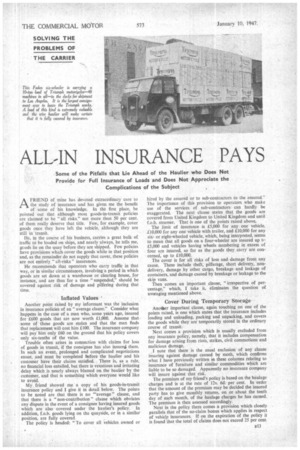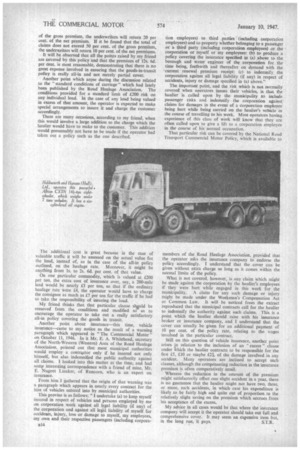ALL-IN INSURANCE PAYS
Page 47

Page 48

If you've noticed an error in this article please click here to report it so we can fix it.
Some of the Pitfalls that Lie Ahead of the Haulier who Does Not Provide for Full Insurance of Loads and Does Not Appreciate the Complications of the Subject
AFRIEND of mine has devoted extraordinary care to the study of insurance and has given me the benefit of some of his knowledge. In the first place, he pointed out that although most goods-in-transit policies are claimed to be "all risks," not more than 50 per cent. of them really deserve that title. Few, for example, cover goods once they have left the vehicle, although they are still in transit.
He, in the course of his business, carries a great bulk of traffic to be loaded on ships, and nearly always, he tells me, geods lie on the quay before they are shipped. Few policies have provisions which cover the goods while in that position and, as the remainder do not supply that cover, these policies are not entirely "all-risks" insurances.
He recommends that operators who carry traffic in that way, or in similar circumstances, involving a period in which goods are set down at a warehouse or clearing house, for instance, and are thus for a time "suspended," should be covered against risk of damage and pilfering during that time.
Inflated Values ' Another point raised by my informant was the inclusion in insurance policies of an "average clause." Consider what happens in the case of a man who, some years ago, insured for £600 goods that are now worth £1,000. Assume that some of those goods are stolen and that the man finds that replacement will cost him £100. The insurance company will pay him only £60 on the ground that his policy covers only six-tenths of the value.
Trouble often arises in connection with claims for loss of goods in transit, if the consignee has also insurefil them. In such an event, prolonged and complicated negotiations ensue, and must be completed before the haulier and his customer have their claims satisfied. There is, as a rule, no financial loss entailed, but there is vexatious and irritating delay which is nearly always blamed on the haulier by the customer, and that is something which everyone would like to avoid.
My friend showed me a copy of his goods-in-transit insurance policy and I give it in detail below. The points to be noted are that there is no "'average" clause, and that there is a " non-contribution " clause which obviates any dispute in the event of a consignee having insured goods which are also covered under the haulier's policy. In addition, f.o.b. goods lying on the quayside, or in a similar position, are fully covered.
The policy is headed: " To cover all vehicles owned or hired by the assured or to sub-contractors to the assured." The importance of this provision to operators who make use of the services of sub-contractors can hardly be exaggerated. The next clause states that the goods are covered from United Kingdom to United Kingdom and until f.o.b. steamer. That is one of the points raised above.
The limit of insurance is £5,000 for any one vehicle, £10,000 for any one vehicle with trailer, and £10,000 for any sixor eight-wheeled vehicle, which, being interpreted, seems to mean that all goods on a four-wheeler are insured up 14£5,000 and vehicles having wheels numbering in excess of four are insured, so far as the goods they carry are concerned, up to £10,000.
The cover is for all risks of loss and damage from any cause. These include theft, pilferage, short delivery, nondelivery, damage by other cargo, breakageand leakage of containers, and damage caused by breakage or leakage to the skip vans. Then comes an important clause, "irrespective of percentage," which, I take it, eliminates the question of averaging mentioned above.
Cover During Temporary Storage
Anoliber important clause, again touching on one of the points raised, is one which states that the insurance includes loading and unloading, packing and unpacking, and covers the goods while they are temporarily stored in the ordinary course of transit. i Next comes a provision which s usually excluded from any insurance policy, namely, that it includes compensation for damage arising from riots, strikes, civil commotions and malicious damage.
I note that there is the usual exclusion of any clause insuring against damage caused by moth, which confirms what I have previously written in these columns relating to insurance of furniture and similar commodities which are liable to be so damaged. Apparently no insurance company will insure against that risk.
The premium of my friend's policy is based on the haulage charges and is at the rate of 12s. 6d: per cent. In order that the amount of the premium may be decided the insured party has to give monthly returns, on or about the tenth day of each month, of the haulage charges he has earned. The premium is then assessed accordingly. Next in the policy there comes a proidsion which closely parallels that of the no-claim bonus which applies in respect of vehicl,e insurances. if on the expiration of the policy it is found ihat the total of claims does not exceed 25 per cent. of the gross premium, the underwriters will return 20 per cent, of the net premium. If it be found that the total of claims does not exceed 50 per cent, of the gross premium, the underwriters will return 10 per cent, of the net premiums.
It will be observed that all the points raised by my friend are covered by this policy and that the premium of 12s. 6d. per cent, is most reasonable, demonstrating that there is no great expense involved in ensuring that the goods-in-transit policy is really all-in and not merely partial cover.
Another point which arose during the discussion related to the "standard conditions of carriage" which had lately been published by the Road Haulage Association. The conditions provided for a standard limit of £200 risk on any individual load. ht the case of any load being valued in excess of that amount, the operator is expected to make special arrangements to insure it and charge the customer accordingly.
There are many occasions, according to my friend. when this would involve a large addition to the charge which the haulier would have to make to the customer. This addition would presumably not have to be made if the operator had taken out a policy such as the one described.
The additional cost is great because in the case of valuable traffic it will be assessed on the actual value for the load, instead of, as in the case of the all-in policy outlined, on the haulage rate. Moreover, it might be anything from Is. to 2s. 6d. per cent, of that value.
On one particular commodity, which is valued at £200 per ton, the extra cost of insurance over, say, a 200-mile lead would be nearly £3 per ton, so that if the ordinary haulage rate were £4, the operator would have to charge the consignee as much as £7 per ton for the traffic if he had to take the responsibility of insuring the load.
My friend thinks that that particular clause should be removed from the conditions and modified so as to encourage the operator to take out a really satisfactory all-in policy covering the goods in transit.
Another point about insurance—this time, vehicle insurance—came to my notice as the result of a warning paragraph which appeared in "The Commercial Motor" on October 11, 1946. In it Mr. E. A. Whitehead, secretary of the North-Western (Western) Area of the Road Haulage Association, pointed out that most municipal authorities would employ a contractor only if he insured not only himself, but also indemniffed the public authority against all claims. I looked into this matter at the time, and bad some interesting correspondence with a friend of mine, Mr. E. Nugent Linaker, of Runcorn, who is an expert on insurance.
From him I gathered that the origin of that warning was a paragraph which appears in nearly every contract for the hire of vehicles entered into by municipal authorities.
This proviso is as follows: "I undertake (a) to keep myself insured in respect of vehicles and persons employed by me on corporation work against all legal liability (if any) of the corporation and against all legal liability of myself for accidents, injury, loss or damage to myself, my employees, my own and their respective passengers (including corpora
tion employees) to third parties (including corporation employees) and to property whether belonging to a passenger or a third party (including corporation employees) or the corporation or myself or my employees: (b) to produce a policy covering the insurance specified hr (a) above to the borough and water engineer of the corporation for the time being, forthwith and thereafter on demand with the 'current renewal premium receipt: (c) to indemnify the corporation against all legal liability (if any) in respect of accidents, injury or damage specified in (a) above."
The important point, and the risk which is not normally covered when operators insure their vehicles, is that the haulier is called upon by the municipality to include passenger risks and indemnify the corporation against claims for damages in the event of a corporation employee being hurt while being carried on the haulier's vehicle in the course of travelling to his work. Most operators having experience of this class of work will know that they are often called upon to give a lift to a corporation employee in the course of his normal occupation, That particular risk can be covered by the National Road Transport Commercial Motor Policy, which is available to members of the Road Haulage Association, provided that the operator asks the insurance company to endorse the policy accordingly. I understand that the cover can be given without extra charge so long as it comes within the normal limits of the policy.
What is not covered, however, is any claim which might be made against the corporation by the haulier's employees if they were hurt while engaged in this work for the municipality. A claim for any such damage or injury might be made under the Workman's Compensation Act or Common Law. It will be noticed from the extract reproduced that the municipal contracts call for the haulier to indemnify the authority against such claims. This is a point which the haulier should raise with his insurance broker or insurance company, and I understand that the cover can usually be given for an additional payment of 10 per cent. of the policy rate, relating to the wages involved in the particular contract.
Still on this question of vehicle insurance, another point arises in relation to the inclusion of an " excess " clause under Zvhich the haulier contracts to be responsible for the first £5, £10 or maybe £24, of the damage involved in any accident. Many operators are inclined to accept such clauses, although the compensating reduction in the insurance premium is often comparatively small.
Whereas the reduction in the amount of the premium might satisfactorily offset one slight accident in a year, there is no guarantee that the haulier might not have two, three, or more, such accidents, in which case his expenditure is likely to be fairly high and quite out of proportion to the relatively slight saving on the premium which accrues from his acceptance of the excess.
My advice in all cases would be that where the insurance company will accept it the operator should take out full and comprehensive cover. It may seem an expensive item but, in the long run, it pays. S.T.R.




















































































